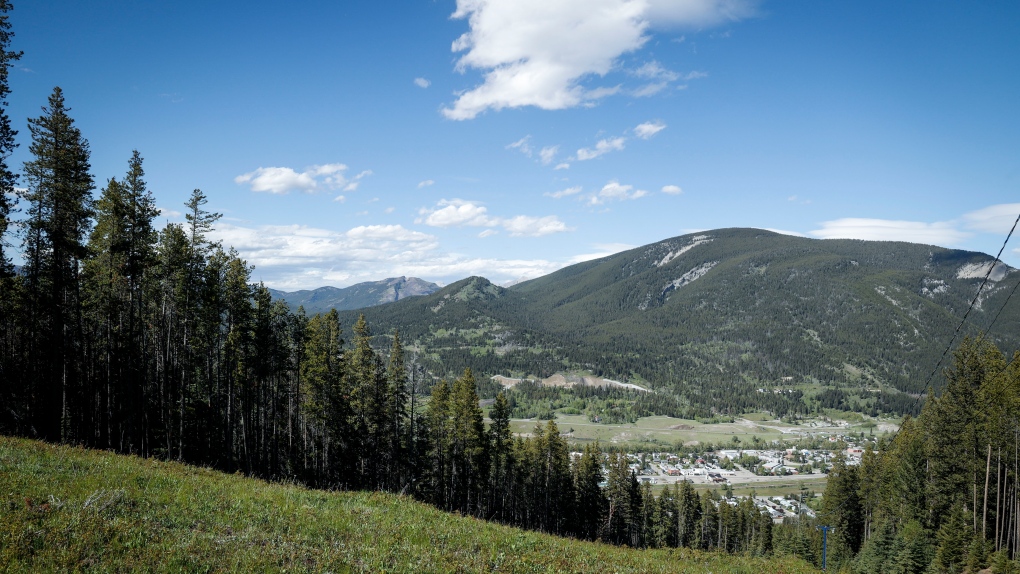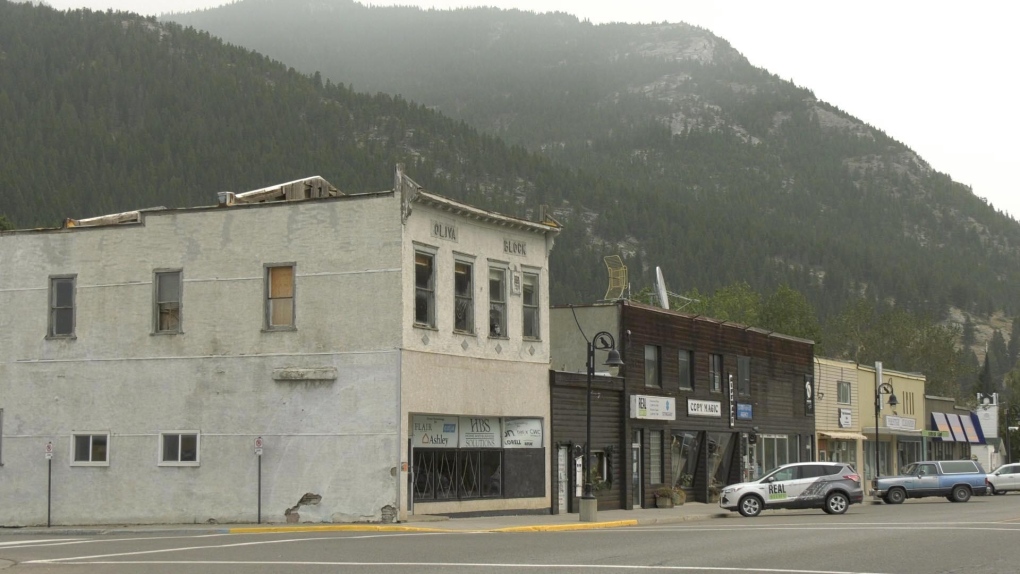Mining company makes extra push by lobbying for coal mine in Crowsnest Pass
 Grassy Mountain, peak to left, and the Grassy Mountain Coal Project are seen north of Blairmore, Alta., Thursday, June 6, 2024. (THE CANADIAN PRESS/Jeff McIntosh)
Grassy Mountain, peak to left, and the Grassy Mountain Coal Project are seen north of Blairmore, Alta., Thursday, June 6, 2024. (THE CANADIAN PRESS/Jeff McIntosh)
Mountains and dense forests surround the pocket of former mining communities in the Crowsnest Pass.
Streams trickle from the mountains, forming waterfalls that bring tourists to the quiet mountain oasis not far from the bustling communities of Canmore and Banff.
Despite the area's beauty and quaint charm, the five communities that make up the municipality of Crowsnest Pass — Bellevue, Blairmore, Coleman, Frank and Hillcrest — are lacking in opportunities due to the fading of forestry and mining industries that they were founded on.
But a proposed mining project might alleviate those worries, an Australian mining company claims.
- Sign up for breaking news alerts from CTV News, right at your fingertips
- The information you need to know, sent directly to you: Download the CTV News App
Benga Mining Limited acquired the Grassy Mountain project from Consol Energy and Devon Energy in 2013.
It wanted a surface steelmaking coal mine at the former Grassy Mountain site, a coal handling and preparation plant, an overland conveyor system and a new section of rail track.
The company applied for an environmental impact study in 2015.
Following years of study, a decision to nix the project was made on Aug. 6, 2021, by Jonathan Wilkinson, the federal environment minister, due to significant environmental concerns.
The company is still intent on making the project happen.
It submitted three applications in 2023 under its parent company's subsidiary, Northback Holdings, to do limited test drilling to determine the composition and location of the coal resource.
Northback CEO Mike Young is among several leaders in the coal mining and transportation industry who are lobbying the province with the Coal Association of Canada (CAC).
The Alberta lobbying registration, dated Sept. 15, states that the group is "advocating for the economic opportunities, primarily from steelmaking coal exports, that coal mining in Alberta offer to Albertans by way of jobs, government revenues and stimulation to local and often rural economies. Many of these opportunities lie in the Eastern Slopes of Alberta, where coal mining has resulted in influx of commerce in the past."
The registration also calls for those with coal mining expertise to be included in decision-making roles.
Neither Northback nor the CAC responded to requests for an interview.
The Ministry of Energy and Minerals said Northback is asking to use water from the lake at the bottom of the non-reclaimed Grassy Mountain site to support the test drilling.
The ministry said it would be "inappropriate" to comment further as "Northback's test drilling application is before the Alberta Energy Regulator's Hearing Commission which is responsible for making a final decision on the application."
Locals to vote
During a Sept. 10 council meeting, Crowsnest Pass councillors passed a motion to hold a non-binding vote on the proposed mine to determine where local support lies.
Similar to a plebiscite or referendum, residents will be asked if they "support the development and operations of the metallurgical coal mine at Grassy Mountain."
The vote will be held on Nov. 25, with advanced polls opening on Nov. 19.
Crowsnest Pass Mayor Blair Painter said they aren't conducting the vote specifically for Northback's project, but they are looking to hear from residents to determine if they want to see the industry come back.
"We're talking to our local residents because that's who we're concerned about," said Painter in an interview. "It has nothing to do with Northback's drilling program."
Eran Kaplinsky, a law professor at the University of Alberta, said the vote might not make much of a difference when it comes to the province's decision to go forward with the mining project.
"Municipalities do not have jurisdiction over natural resource extraction projects," said Kaplinsky in an interview. "They have limited jurisdiction over the planning aspects. Provincial approval supersedes any municipal approval on such questions.
"All that the question can yield is the level of support in the community for that kind of project."
However, Kaplinsky adds that the level of support may be evidence for other regulatory bodies or approval agencies such as the Alberta Energy Regulator (AER) or the federal Impact Assessment Agency of Canada.
Northback has created a campaign on its website in response to the community's upcoming vote, encouraging residents of the Crowsnest Pass to "vote yes" on the Grassy Mountain project.
The AER gave the Northback drilling project advanced project status on Feb. 23 of this year.
The regulator said projects are given advanced status when a proponent has submitted a project summary to the AER for the purposes of determining whether an environmental impact is required.
A letter from Minister of Energy and Minerals Brian Jean said, "once a project is considered an advanced project, it remains as one regardless of the outcome of regulatory applications submitted before it was declared an advanced project."
 An Australian company has bid to build the Grassy Mountain Coal project — a 2,800-hectare coal mine north of Blairmore.
An Australian company has bid to build the Grassy Mountain Coal project — a 2,800-hectare coal mine north of Blairmore.
Environmental impacts
As part of an assessment done by a joint review panel with the AER and the Canadian Environmental Assessment Agency, Benga argued the proposed project was not likely to cause any significant adverse effects following mitigation measures.
However, in a 2021 report, the panel found Benga's claims to be overly optimistic, and they were not assured about the feasibility of some of the proposed mitigation measures.
"While Benga acknowledged the importance of taking a conservative approach to the identification and assessment of project effects, we find that in practice it did not always do so," the report said.
"Overly optimistic assumptions resulted in a likely underestimate of predicted project effects in some areas, such as for surface water quality and human health, and this reduces our confidence in Benga's assessment."
Based on the assessment, the review panel concluded that the project is "likely to result in significant adverse environmental effects on surface water quality, westslope cutthroat trout and their habitat, whitebark pine, rough fescue grasslands and vegetation species and community biodiversity."
A decision on the environmental assessment was released on Aug. 26, 2021, stating "the significant adverse environmental effects that the project is likely to cause are not justified in the circumstances."
However, Painter said the Grassy Mountain project is getting compared to older mines in British Columbia that are still operating, but were developed before there were stringent regulations to protect the environment such as exist today.
 Grassy Mountain, peak on left, and the Grassy Mountain Coal Project are seen Thursday, June 6, 2024. (THE CANADIAN PRESS/Jeff McIntosh)
Grassy Mountain, peak on left, and the Grassy Mountain Coal Project are seen Thursday, June 6, 2024. (THE CANADIAN PRESS/Jeff McIntosh)
Coal mining was once a booming industry in the Crowsnest Pass, with the first mines opening in the 1870s.
The last mine in the area closed in 1983.
The 1976 Coal Development Policy for Alberta limited coal mining in the area to protect the Rocky Mountains.
But in 2020, the province's UCP government rescinded the 1976 policy to allow for more open-pit mining exploration in the Rockies.
Due to public outcry, the policy was reinstated in 2021 and the Coal Policy Committee was established to make recommendations on Alberta's coal industry.
Coal from the Grassy Mountain mine would be used for steel and not electricity, as Alberta has stated that it will finish phasing out its coal power plants by 2024.
Still, the environmental impacts of open-pit mining continue to be a concern.
Northback claims that its "planned reclamation" of the land will "provide improved conditions for regrowth and rehabilitation."
The company said old machines, debris and "abandoned waste" litter the mountainside from the previous mine, which closed over 60 years ago.
Northback has said that by taking over the mine, they will "clean up" the area, which currently poses safety risks for those who venture near the site.
"The company will be able to reclaim the previously disturbed and abandoned site, making it safe and enabling future use by locals, Indigenous peoples, Albertans and Canadians," said a promotional video on Northback's website.
"If this project is to go ahead, it's an opportunity to get gainful employment and enrich our community for the next 25 to 30 years," said Painter.
"After that [the land] will be reclaimed. If it doesn't, then it will never get reclaimed."
CTVNews.ca Top Stories

Can the Governor General do what Pierre Poilievre is asking? This expert says no
A historically difficult week for Prime Minister Justin Trudeau and his Liberal government ended with a renewed push from Conservative Leader Pierre Poilievre to topple this government – this time in the form a letter to the Governor General.
Two U.S. Navy pilots shot down over Red Sea in apparent 'friendly fire' incident, U.S. military says
Two U.S. Navy pilots were shot down Sunday over the Red Sea in an apparent 'friendly fire' incident, the U.S military said, marking the most serious incident to threaten troops in over a year of America targeting Yemen's Houthi rebels.
Ottawa MP Mona Fortier appointed chief government whip
Ottawa-Vanier MP Mona Fortier has been appointed as chief government whip, the latest addition in a major reshuffle of Prime Minister Justin Trudeau's cabinet.
opinion Tom Mulcair: Prime Minister Justin Trudeau's train wreck of a final act
In his latest column for CTVNews.ca, former NDP leader and political analyst Tom Mulcair puts a spotlight on the 'spectacular failure' of Prime Minister Justin Trudeau's final act on the political stage.
B.C. mayor gets calls from across Canada about 'crazy' plan to recruit doctors
A British Columbia community's "out-of-the-box" plan to ease its family doctor shortage by hiring physicians as city employees is sparking interest from across Canada, says Colwood Mayor Doug Kobayashi.
Bluesky finds with growth comes growing pains - and bots
Bluesky has seen its user base soar since the U.S. presidential election, boosted by people seeking refuge from Elon Musk's X, which they view as increasingly leaning too far to the right given its owner's support of U.S. president-elect Donald Trump, or wanting an alternative to Meta's Threads and its algorithms.
'There’s no support': Domestic abuse survivor shares difficulties leaving her relationship
An Edmonton woman who tried to flee an abusive relationship ended up back where she started in part due to a lack of shelter space.
opinion King Charles' Christmas: Who's in and who's out this year?
Christmas 2024 is set to be a Christmas like no other for the Royal Family, says royal commentator Afua Hagan. King Charles III has initiated the most important and significant transformation of royal Christmas celebrations in decades.
OPP find wanted man by chance in eastern Ontario home, seize $50K worth of drugs
A wanted eastern Ontario man was found with $50,000 worth of drugs and cash on him in a home in Bancroft, Ont. on Friday morning, according to the Ontario Provincial Police (OPP).

































